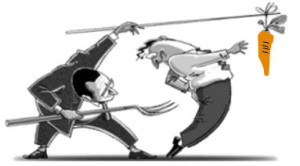Do you use Sales Performance Management?
 In his latest research for Aberdeen, Peter Ostrow has uncovered some interesting insights into some key problems around sales management and their attempt to deal with sales performance.
In his latest research for Aberdeen, Peter Ostrow has uncovered some interesting insights into some key problems around sales management and their attempt to deal with sales performance.
Simply managing a sales team today has changed dramatically over the years and the old “carrot and stick” method no longer works like before. Today’s sales managers need to be more creative and use concepts like “Gamification” to motivate, modify, or reward distinct behaviors. Sales managers are concerned about keeping their high performers on target to hit their quotas, while getting the whole sales organization to sell more goods or services to maintain and increase new corporate growth. Getting your sales people to increase their sales forecasting, sales cycle reduction and lead conversion effectiveness, is certainly a step in the right direction.
According to Peter’s report he indicated that a “kinder, gentler” approach towards managing B2B sales teams works more effectively than the dog-eat-dog approach of days gone by. So, one of the most successful approaches to this SPM (sales performance management) strategy is figuring what works for the most successful sellers and then re-creating what has worked for them and integrating it with the rest of the sales force. Peter writes: “Building and developing sales teams naturally follows this process, when savvy sales leaders are able to institutionalize the “tribal knowledge” of their best performers and create training methodologies that help in getting new sales reps productive more quickly. Considering that the average hiring cost of a new individual contributor is $29,060, and the time to hire and onboard them averages 6.24 months, this focus on productivity is well founded.”
Those organizations that adopt the knowledge management capabilities and incorporate the “tribal knowledge” culture within their organization have shown that they outperform those organizations that don’t by as much as 28%! The new millennial-aged sellers have grown up in an environment where user-generated content and overall sharing of best practices and communal knowledge is part of their sales DNA. So, that being said, management needs to understand this DNA and make sure that they capture it and deliver it in a way that will allow others to capitalize on it. The whole area of taking what you know and sharing it with those that don’t is just common sense. I believe that this will provide a way for management to increase and manage sales performance.
At least that’s the way I see it, what say you?


“figuring what works for the most successful sellers and then re-creating
what has worked for them and integrating it with the rest of the sales
force.”
Figuring that out means looking at some hard data. What makes one sales rep better than another? When you can analyze individual successes you can turn that data into a training program that helps your whole team?
Thanks Pat I agree.
Sorry Pat that my response to you didn’t get posted. You are right, it’s capitalizing on the “Tribal Knowledge” that every sales person has that should be cultivated and then used in training. Good for you and thanks for your comment.